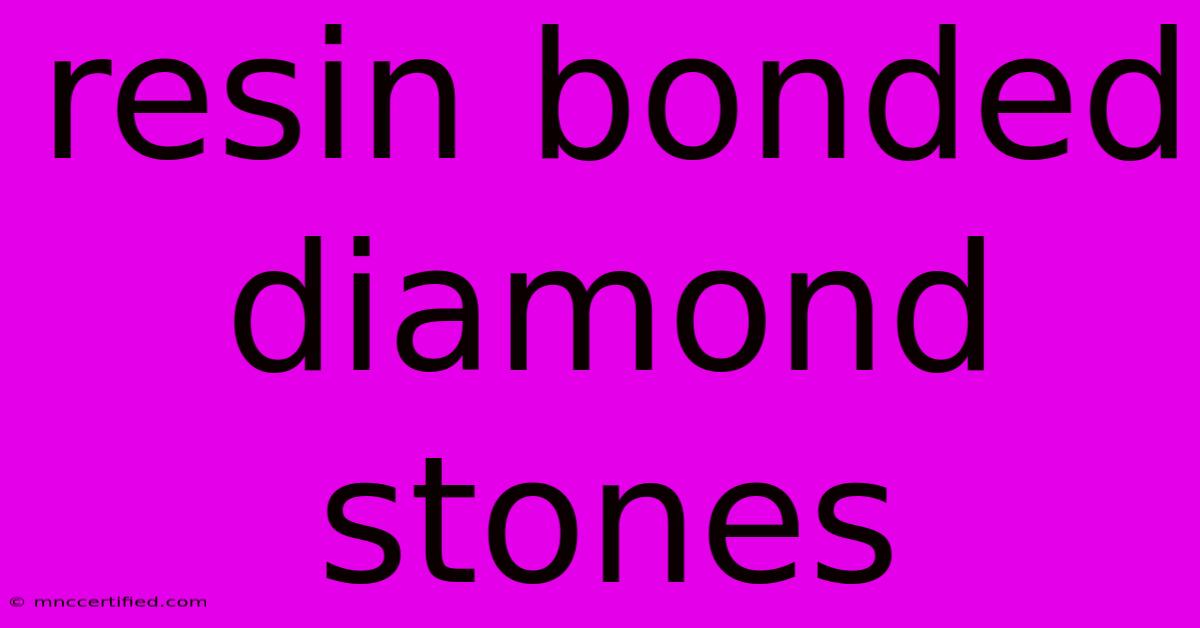Resin Bonded Diamond Stones

Table of Contents
Resin Bonded Diamond Stones: The Ultimate Guide for Professionals
Resin bonded diamond stones are indispensable tools in various industries, offering unparalleled cutting and grinding capabilities. Understanding their properties, applications, and selection is crucial for maximizing efficiency and achieving optimal results. This comprehensive guide delves into everything you need to know about resin bonded diamond stones, helping you make informed purchasing decisions and enhance your workflow.
What are Resin Bonded Diamond Stones?
Resin bonded diamond stones are composed of industrial-grade diamonds embedded in a resin matrix. This matrix, usually a thermosetting resin, holds the diamonds securely and determines the stone's properties, including its durability, aggressiveness, and lifespan. The concentration and size of the diamonds directly impact the stone's cutting performance. Unlike metal-bonded diamond tools, resin bonded stones are generally less expensive and easier to shape into various profiles, making them versatile for a wide array of applications.
Key Characteristics and Properties
Several factors differentiate resin bonded diamond stones and influence their suitability for specific tasks:
- Diamond Concentration: Higher diamond concentrations result in faster cutting rates but can reduce the stone's lifespan. Lower concentrations offer longer life but slower cutting.
- Diamond Size: Larger diamonds are ideal for rough cutting and aggressive material removal, while finer diamonds provide a smoother finish.
- Resin Type: Different resin formulations affect the stone's hardness, flexibility, and resistance to heat and wear.
- Bond Hardness: This property determines the stone's ability to hold the diamonds securely under pressure. A softer bond is better suited for softer materials, while a harder bond is necessary for harder materials.
- Shape and Size: Resin bonded diamond stones are available in a wide range of shapes and sizes, including wheels, disks, points, and cups, catering to various applications.
Applications of Resin Bonded Diamond Stones
These versatile tools find applications across numerous industries:
- Stone Fabrication: Cutting, shaping, and polishing granite, marble, quartz, and other natural stones.
- Glass Processing: Cutting, grinding, and polishing glass.
- Ceramics and Tile: Cutting, grinding, and shaping ceramic tiles and other ceramic materials.
- Concrete and Masonry: Cutting, grinding, and smoothing concrete surfaces.
- Dental and Medical: Used in dental procedures and other medical applications requiring precision cutting.
- Jewelry Making: Shaping and polishing precious metals and gemstones.
Choosing the Right Resin Bonded Diamond Stone
Selecting the appropriate resin bonded diamond stone requires careful consideration of several factors:
- Material being processed: The hardness and type of material dictate the necessary diamond concentration, size, and bond hardness.
- Desired finish: A rough finish requires a coarser stone, while a fine finish needs a finer stone.
- Cutting speed: Higher cutting speeds require stones with higher diamond concentration.
- Machine compatibility: Ensure the stone's dimensions and arbor size are compatible with your cutting machine.
Maintenance and Safety Precautions
Proper maintenance and safety measures are essential when using resin bonded diamond stones:
- Proper cooling: Adequate cooling is crucial to prevent overheating and damage to the stone and the material being processed.
- Consistent speed: Maintaining a consistent speed prevents uneven wear and tear.
- Appropriate PPE: Always wear appropriate personal protective equipment (PPE), including safety glasses, gloves, and a dust mask.
- Storage: Store stones in a dry, safe place to prevent damage and corrosion.
Resin Bonded Diamond Stones vs. Other Abrasives
Compared to other abrasives, resin bonded diamond stones offer several advantages:
- Faster Cutting Rates: Generally faster than other methods for many materials.
- Precise Cutting: Allows for precise cuts and shaping.
- Versatile Applications: Suitable for a wide range of materials and applications.
- Cost-Effective: Offers a balance of performance and cost.
However, they may not be suitable for all applications, and alternatives like metal-bonded diamond tools might be preferable for exceptionally hard materials or heavy-duty applications.
Conclusion
Resin bonded diamond stones are powerful and versatile tools crucial for achieving high-quality results in various industries. By understanding their characteristics, applications, and proper use, professionals can optimize their performance and enhance productivity. Remember to always prioritize safety and follow manufacturer guidelines for optimal results and longevity. Investing in quality resin bonded diamond stones is an investment in efficiency and precision.

Thank you for visiting our website wich cover about Resin Bonded Diamond Stones. We hope the information provided has been useful to you. Feel free to contact us if you have any questions or need further assistance. See you next time and dont miss to bookmark.
Featured Posts
-
Cotten Coverage Insurance Ny
Dec 01, 2024
-
Key Visits For Top Football Prospects
Dec 01, 2024
-
Big Hit Sidelines Ohio States Howard
Dec 01, 2024
-
Iron Bowl Injury Report Players Out
Dec 01, 2024
-
Bond Skyfall Leather Jacket
Dec 01, 2024